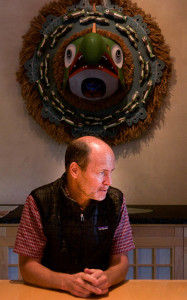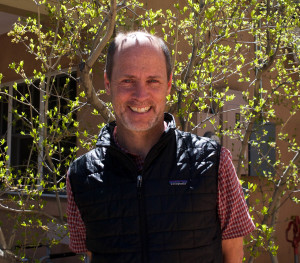Tags
Related Posts
Share This
Wild Earth Guardians

Horning in the conference room. Photo by Whitney Wernick.
From rabbits, crows, coyotes and the occasional bear, Santa Fe has its fair share of wildlife. Wild Earth Guardians is the nonprofit organization that protects that wildlife not only locally but across all 11 western states. With offices in cities like Santa Fe, Tucson, Denver, Portland and many more, Wild Earth Guardians work to protect the rights, the voices and the spaces of animals, forests and rivers of the American West.
For those with a strong interest in wildlife preservation, there are countless volunteer opportunities, rallies and even jobs where passionate individuals can have their voices heard. “If you are angry or upset about the fate of the world, show up and get involved,” says John Horning, executive director. “A lot of our work is trying to influence the decisions of federal and state agencies,” Horning says. Some of the organization’s recent work includes opposing divestment of fossil fuels, or government seizing of fossil fuels that underlay federal, public lands. “Part of our job is to assert that there is a public interest, that these lands are a part of our common heritage,” Horning says.
Just last week, Wild Earth Guardians held a rally in protest of the Bureau of Land Management holding a quarterly lease sale to sell off the oil and fuel from the public lands. “We held this rally to show that we are opposed to this decision. It’s a part of our campaign to keep fossil fuels in the ground,” Horning says.
But fighting divestment is only one of the many tasks taken on by those at Wild Earth Guardians. Other current battles include defending the rights of southwestern rivers, including the Rio Grande. “[When] decisions were made about the Rio Grande, they didn’t give the river a seat at the table,” Horning says. All of the water currently flowing through the Rio Grande is considered purchased property. “The only reason you see any water in the river is when it’s flowing to somebody else. The river is denied its own water.”

Portrait of John Horning, executive director of Wild Earth Guardians. Photo by Whitney Wernick.
Horning says that one of his favorite parts of the work is the gratitude from the communities. “[People thank us] for being their voice and showing up to fight for the voiceless.” Wild Earth Guardians has an ever growing social media presence and uses its website, Facebook and Twitter to educate and promote its causes. Information about the group’s work against divestment has its own hashtag, #keepintheground. “Persistence is such an important part of the work,” Horning says before referring to the speech “If there is no struggle, there is no progress,” by abolitionist, Frederick Douglas. “Our work is to change power structures and the balance of power,” Horning says. “And that’s a struggle.
For example, after the wolves native to New Mexico were killed off, conservationists began the reintroduction of wolves to the southwest in 1998. To this day there are still fewer than 100 wolves in the wild. Horning describes an experience that stuck with him throughout his 22 years of working with Wild Earth Guardians. “I did a five-day backpack trip in the wilderness…and on the last night of that trip I was awakened twice by the sound of a pack of wolves howling. There’s something very primal about that experience. Knowing that we helped bring them back and knowing that we’re fighting day in and day out [to protect them].”
Volunteers with communications skills, specifically in social media and film are in high demand. To get involved, visit the website or simply walk in the door of the Santa Fe office.






 Jackalope Magazine is the student magazine of Santa Fe University of Art and Design. Building on the interdisciplinary nature of our education, we aim to showcase the talent of our university and character of our city.
Jackalope Magazine is the student magazine of Santa Fe University of Art and Design. Building on the interdisciplinary nature of our education, we aim to showcase the talent of our university and character of our city.
Recent Comments